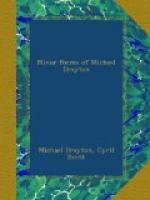Sonnet 58
To Prouerbe
As Loue and I, late harbour’d in one Inne, With Prouerbs thus each other intertaine; In loue there is no lacke, thus I beginne? Faire words makes fooles, replieth he againe? That spares to speake, doth spare to speed (quoth I) As well (saith he) too forward as too slow. Fortune assists the boldest, I replie? A hasty man (quoth he) nere wanted woe. Labour is light, where loue (quoth I) doth pay, (Saith he) light burthens heauy, if farre borne? (Quoth I) the maine lost, cast the by away: You haue spunne a faire thred, he replies in scorne.
And hauing thus a while each other thwarted,
Fooles as we met, so fooles againe we parted.
Sonnet 63
To the high and mighty Prince, James, King of Scots
Not thy graue Counsells, nor
thy Subiects loue,
Nor all that famous Scottish
royaltie,
Or what thy soueraigne greatnes
may approue,
Others in vaine doe but historifie,
When thine owne glorie from
thy selfe doth spring,
As though thou did’st,
all meaner prayses scorne:
Of Kings a Poet, and the Poets
King,
They Princes, but thou Prophets
do’st adorne;
Whilst others by their Empires
are renown’d,
Thou do’st enrich thy
Scotland with renowne,
And Kings can but with Diadems
be crown’d,
But with thy Laurell, thou
doo’st crowne thy Crowne;
That they whose
pens, euen life to Kings doe giue,
In thee a King,
shall seeke them selues to liue.
Sonnet 66
To the Lady L.S.
Bright starre of Beauty, on
whose eyelids sit,
A thousand Nimph-like and
enamoured Graces,
The Goddesses of memory and
wit,
Which in due order take their
seuerall places,
In whose deare bosome, sweet
delicious loue,
Layes downe his quiuer, that
he once did beare,
Since he that blessed Paradice
did proue,
Forsooke his mothers lap to
sport him there.
Let others striue to entertaine
with words,
My soule is of another temper
made;
I hold it vile that vulgar
wit affords,
Deuouring time my faith, shall
not inuade:
Still let my praise
be honoured thus by you,
Be you most worthy,
whilst I be most true.
[from the Edition of 1605]
Sonnet 43
Why should your faire eyes
with such soueraine grace,
Dispearse their raies on euery
vulgar spirit,
Whilst I in darknes in the
selfesame place,
Get not one glance to recompence
my merit:
So doth the plow-man gaze
the wandring starre,
And onely rests contented
with the light,
That neuer learnd what constellations
are,
Beyond the bent of his vnknowing
sight.
O why should beautie (custome




